Nutrition and Cancer: Nutrition and Cancer Research Paper
VerifiedAdded on 2023/04/25
|6
|1200
|376
Report
AI Summary
This research paper examines the critical role of nutrition in both the prevention and management of cancer. It highlights how a diet rich in antioxidants, fiber, and healthy fats can aid in cancer prevention, while also emphasizing the importance of tailored dietary plans for cancer patients. The paper discusses the impact of functional food components, such as nutraceuticals, and the need to eliminate detrimental dietary elements like trans fats and sugars. Furthermore, it addresses the specific nutritional needs of cancer patients, including the importance of high-protein, high-calorie diets, and strategies to combat side effects like dysphagia, dysgeusia, and fatigue. The conclusion underscores the significance of personalized dietary approaches and the potential of nutrition to improve health outcomes for those affected by cancer.
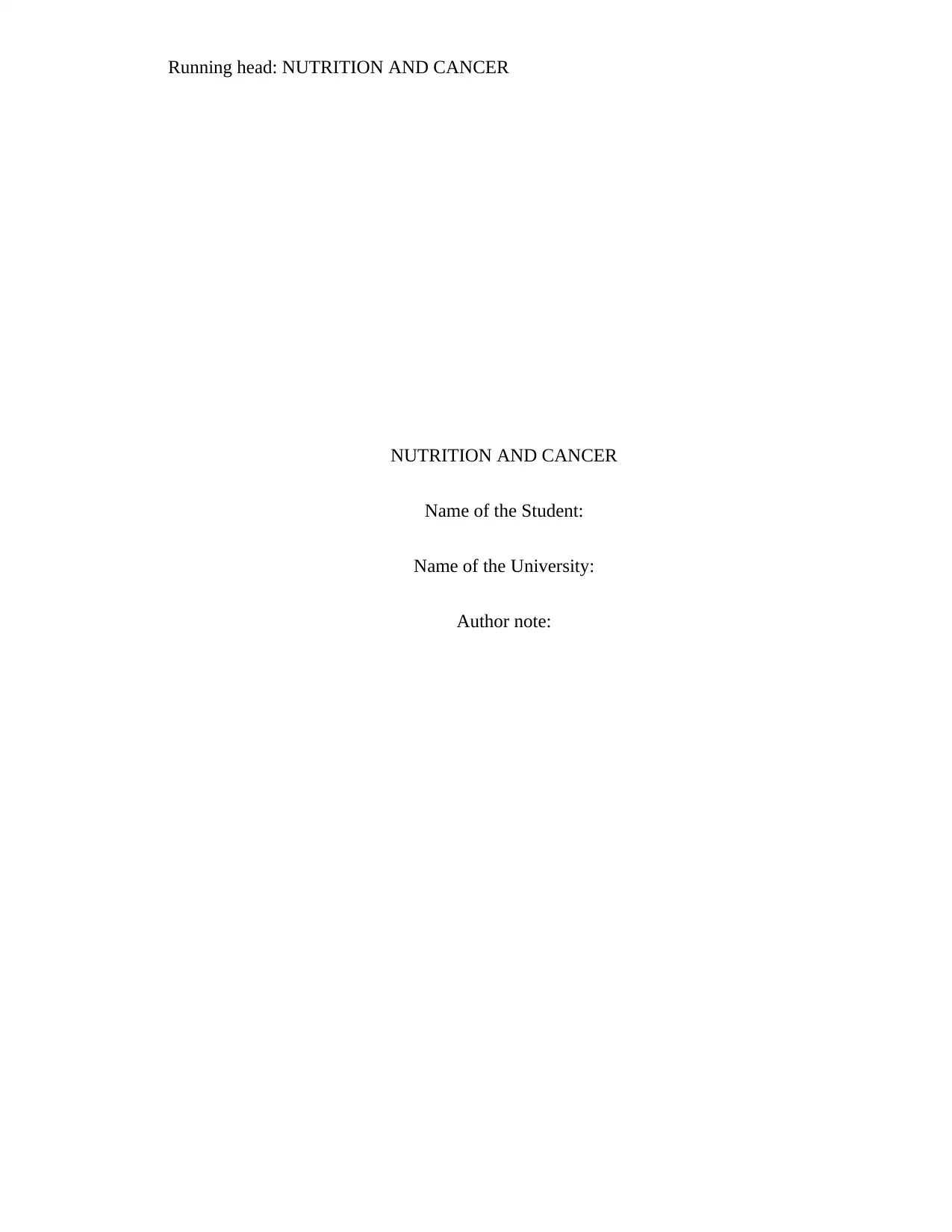
Running head: NUTRITION AND CANCER
NUTRITION AND CANCER
Name of the Student:
Name of the University:
Author note:
NUTRITION AND CANCER
Name of the Student:
Name of the University:
Author note:
Paraphrase This Document
Need a fresh take? Get an instant paraphrase of this document with our AI Paraphraser
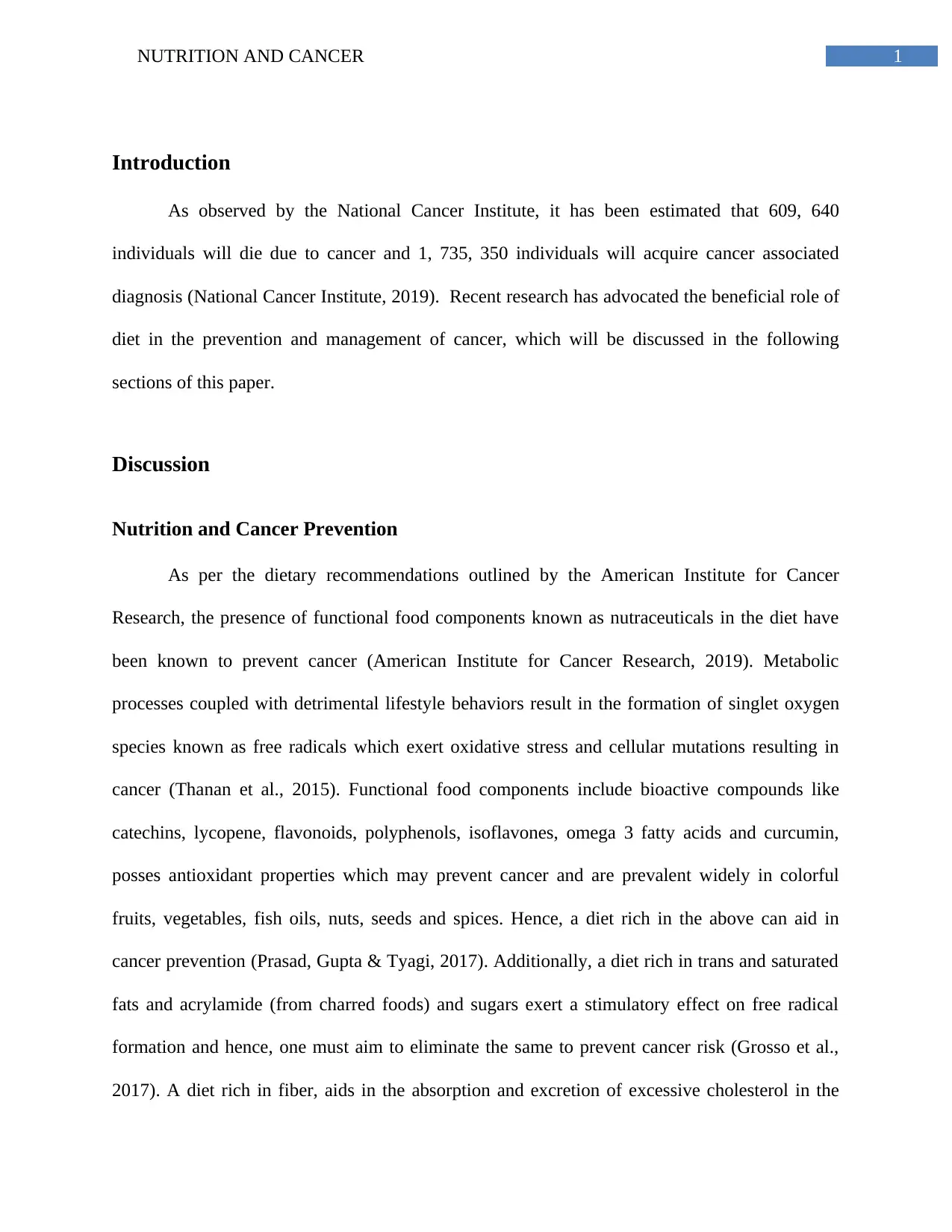
1NUTRITION AND CANCER
Introduction
As observed by the National Cancer Institute, it has been estimated that 609, 640
individuals will die due to cancer and 1, 735, 350 individuals will acquire cancer associated
diagnosis (National Cancer Institute, 2019). Recent research has advocated the beneficial role of
diet in the prevention and management of cancer, which will be discussed in the following
sections of this paper.
Discussion
Nutrition and Cancer Prevention
As per the dietary recommendations outlined by the American Institute for Cancer
Research, the presence of functional food components known as nutraceuticals in the diet have
been known to prevent cancer (American Institute for Cancer Research, 2019). Metabolic
processes coupled with detrimental lifestyle behaviors result in the formation of singlet oxygen
species known as free radicals which exert oxidative stress and cellular mutations resulting in
cancer (Thanan et al., 2015). Functional food components include bioactive compounds like
catechins, lycopene, flavonoids, polyphenols, isoflavones, omega 3 fatty acids and curcumin,
posses antioxidant properties which may prevent cancer and are prevalent widely in colorful
fruits, vegetables, fish oils, nuts, seeds and spices. Hence, a diet rich in the above can aid in
cancer prevention (Prasad, Gupta & Tyagi, 2017). Additionally, a diet rich in trans and saturated
fats and acrylamide (from charred foods) and sugars exert a stimulatory effect on free radical
formation and hence, one must aim to eliminate the same to prevent cancer risk (Grosso et al.,
2017). A diet rich in fiber, aids in the absorption and excretion of excessive cholesterol in the
Introduction
As observed by the National Cancer Institute, it has been estimated that 609, 640
individuals will die due to cancer and 1, 735, 350 individuals will acquire cancer associated
diagnosis (National Cancer Institute, 2019). Recent research has advocated the beneficial role of
diet in the prevention and management of cancer, which will be discussed in the following
sections of this paper.
Discussion
Nutrition and Cancer Prevention
As per the dietary recommendations outlined by the American Institute for Cancer
Research, the presence of functional food components known as nutraceuticals in the diet have
been known to prevent cancer (American Institute for Cancer Research, 2019). Metabolic
processes coupled with detrimental lifestyle behaviors result in the formation of singlet oxygen
species known as free radicals which exert oxidative stress and cellular mutations resulting in
cancer (Thanan et al., 2015). Functional food components include bioactive compounds like
catechins, lycopene, flavonoids, polyphenols, isoflavones, omega 3 fatty acids and curcumin,
posses antioxidant properties which may prevent cancer and are prevalent widely in colorful
fruits, vegetables, fish oils, nuts, seeds and spices. Hence, a diet rich in the above can aid in
cancer prevention (Prasad, Gupta & Tyagi, 2017). Additionally, a diet rich in trans and saturated
fats and acrylamide (from charred foods) and sugars exert a stimulatory effect on free radical
formation and hence, one must aim to eliminate the same to prevent cancer risk (Grosso et al.,
2017). A diet rich in fiber, aids in the absorption and excretion of excessive cholesterol in the
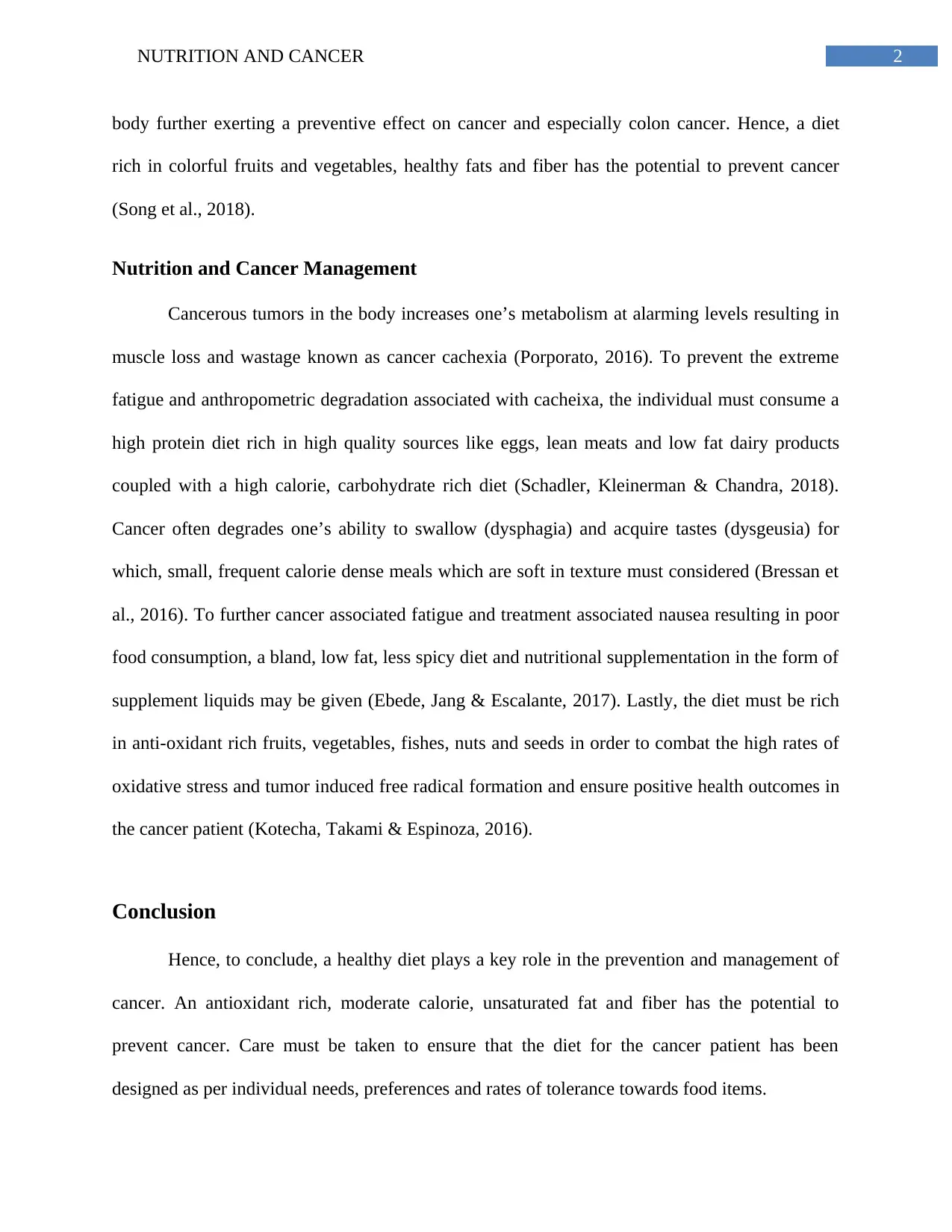
2NUTRITION AND CANCER
body further exerting a preventive effect on cancer and especially colon cancer. Hence, a diet
rich in colorful fruits and vegetables, healthy fats and fiber has the potential to prevent cancer
(Song et al., 2018).
Nutrition and Cancer Management
Cancerous tumors in the body increases one’s metabolism at alarming levels resulting in
muscle loss and wastage known as cancer cachexia (Porporato, 2016). To prevent the extreme
fatigue and anthropometric degradation associated with cacheixa, the individual must consume a
high protein diet rich in high quality sources like eggs, lean meats and low fat dairy products
coupled with a high calorie, carbohydrate rich diet (Schadler, Kleinerman & Chandra, 2018).
Cancer often degrades one’s ability to swallow (dysphagia) and acquire tastes (dysgeusia) for
which, small, frequent calorie dense meals which are soft in texture must considered (Bressan et
al., 2016). To further cancer associated fatigue and treatment associated nausea resulting in poor
food consumption, a bland, low fat, less spicy diet and nutritional supplementation in the form of
supplement liquids may be given (Ebede, Jang & Escalante, 2017). Lastly, the diet must be rich
in anti-oxidant rich fruits, vegetables, fishes, nuts and seeds in order to combat the high rates of
oxidative stress and tumor induced free radical formation and ensure positive health outcomes in
the cancer patient (Kotecha, Takami & Espinoza, 2016).
Conclusion
Hence, to conclude, a healthy diet plays a key role in the prevention and management of
cancer. An antioxidant rich, moderate calorie, unsaturated fat and fiber has the potential to
prevent cancer. Care must be taken to ensure that the diet for the cancer patient has been
designed as per individual needs, preferences and rates of tolerance towards food items.
body further exerting a preventive effect on cancer and especially colon cancer. Hence, a diet
rich in colorful fruits and vegetables, healthy fats and fiber has the potential to prevent cancer
(Song et al., 2018).
Nutrition and Cancer Management
Cancerous tumors in the body increases one’s metabolism at alarming levels resulting in
muscle loss and wastage known as cancer cachexia (Porporato, 2016). To prevent the extreme
fatigue and anthropometric degradation associated with cacheixa, the individual must consume a
high protein diet rich in high quality sources like eggs, lean meats and low fat dairy products
coupled with a high calorie, carbohydrate rich diet (Schadler, Kleinerman & Chandra, 2018).
Cancer often degrades one’s ability to swallow (dysphagia) and acquire tastes (dysgeusia) for
which, small, frequent calorie dense meals which are soft in texture must considered (Bressan et
al., 2016). To further cancer associated fatigue and treatment associated nausea resulting in poor
food consumption, a bland, low fat, less spicy diet and nutritional supplementation in the form of
supplement liquids may be given (Ebede, Jang & Escalante, 2017). Lastly, the diet must be rich
in anti-oxidant rich fruits, vegetables, fishes, nuts and seeds in order to combat the high rates of
oxidative stress and tumor induced free radical formation and ensure positive health outcomes in
the cancer patient (Kotecha, Takami & Espinoza, 2016).
Conclusion
Hence, to conclude, a healthy diet plays a key role in the prevention and management of
cancer. An antioxidant rich, moderate calorie, unsaturated fat and fiber has the potential to
prevent cancer. Care must be taken to ensure that the diet for the cancer patient has been
designed as per individual needs, preferences and rates of tolerance towards food items.
⊘ This is a preview!⊘
Do you want full access?
Subscribe today to unlock all pages.

Trusted by 1+ million students worldwide
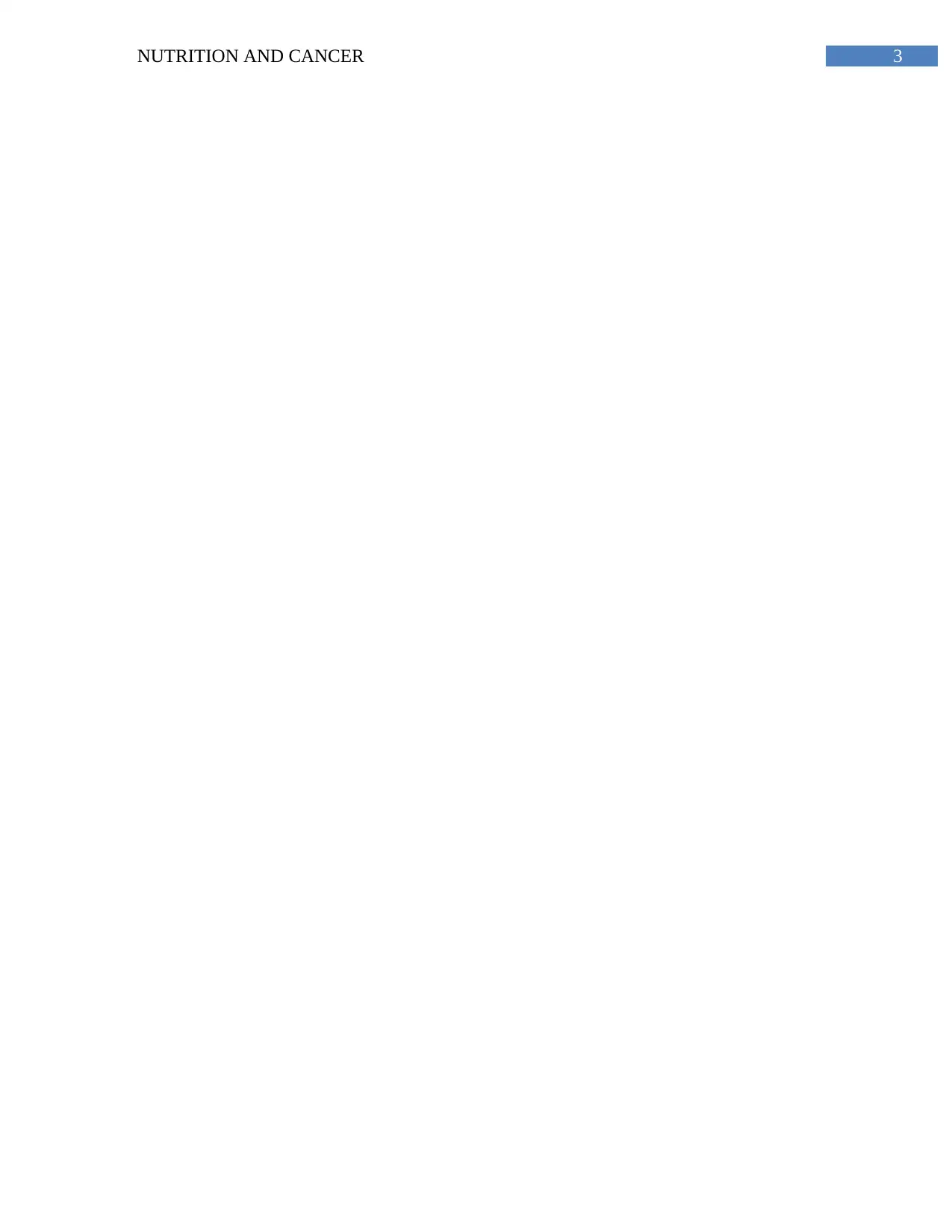
3NUTRITION AND CANCER
Paraphrase This Document
Need a fresh take? Get an instant paraphrase of this document with our AI Paraphraser
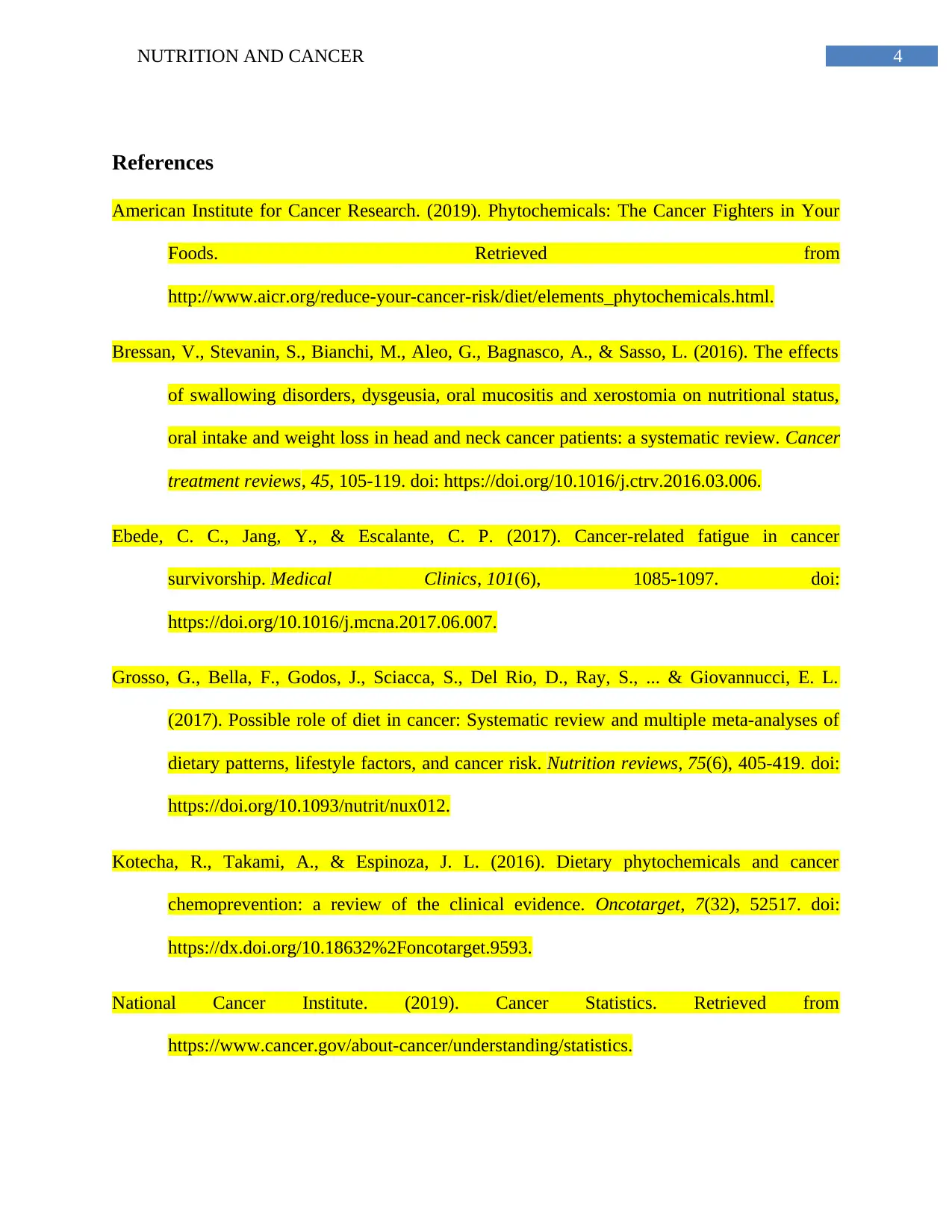
4NUTRITION AND CANCER
References
American Institute for Cancer Research. (2019). Phytochemicals: The Cancer Fighters in Your
Foods. Retrieved from
http://www.aicr.org/reduce-your-cancer-risk/diet/elements_phytochemicals.html.
Bressan, V., Stevanin, S., Bianchi, M., Aleo, G., Bagnasco, A., & Sasso, L. (2016). The effects
of swallowing disorders, dysgeusia, oral mucositis and xerostomia on nutritional status,
oral intake and weight loss in head and neck cancer patients: a systematic review. Cancer
treatment reviews, 45, 105-119. doi: https://doi.org/10.1016/j.ctrv.2016.03.006.
Ebede, C. C., Jang, Y., & Escalante, C. P. (2017). Cancer-related fatigue in cancer
survivorship. Medical Clinics, 101(6), 1085-1097. doi:
https://doi.org/10.1016/j.mcna.2017.06.007.
Grosso, G., Bella, F., Godos, J., Sciacca, S., Del Rio, D., Ray, S., ... & Giovannucci, E. L.
(2017). Possible role of diet in cancer: Systematic review and multiple meta-analyses of
dietary patterns, lifestyle factors, and cancer risk. Nutrition reviews, 75(6), 405-419. doi:
https://doi.org/10.1093/nutrit/nux012.
Kotecha, R., Takami, A., & Espinoza, J. L. (2016). Dietary phytochemicals and cancer
chemoprevention: a review of the clinical evidence. Oncotarget, 7(32), 52517. doi:
https://dx.doi.org/10.18632%2Foncotarget.9593.
National Cancer Institute. (2019). Cancer Statistics. Retrieved from
https://www.cancer.gov/about-cancer/understanding/statistics.
References
American Institute for Cancer Research. (2019). Phytochemicals: The Cancer Fighters in Your
Foods. Retrieved from
http://www.aicr.org/reduce-your-cancer-risk/diet/elements_phytochemicals.html.
Bressan, V., Stevanin, S., Bianchi, M., Aleo, G., Bagnasco, A., & Sasso, L. (2016). The effects
of swallowing disorders, dysgeusia, oral mucositis and xerostomia on nutritional status,
oral intake and weight loss in head and neck cancer patients: a systematic review. Cancer
treatment reviews, 45, 105-119. doi: https://doi.org/10.1016/j.ctrv.2016.03.006.
Ebede, C. C., Jang, Y., & Escalante, C. P. (2017). Cancer-related fatigue in cancer
survivorship. Medical Clinics, 101(6), 1085-1097. doi:
https://doi.org/10.1016/j.mcna.2017.06.007.
Grosso, G., Bella, F., Godos, J., Sciacca, S., Del Rio, D., Ray, S., ... & Giovannucci, E. L.
(2017). Possible role of diet in cancer: Systematic review and multiple meta-analyses of
dietary patterns, lifestyle factors, and cancer risk. Nutrition reviews, 75(6), 405-419. doi:
https://doi.org/10.1093/nutrit/nux012.
Kotecha, R., Takami, A., & Espinoza, J. L. (2016). Dietary phytochemicals and cancer
chemoprevention: a review of the clinical evidence. Oncotarget, 7(32), 52517. doi:
https://dx.doi.org/10.18632%2Foncotarget.9593.
National Cancer Institute. (2019). Cancer Statistics. Retrieved from
https://www.cancer.gov/about-cancer/understanding/statistics.
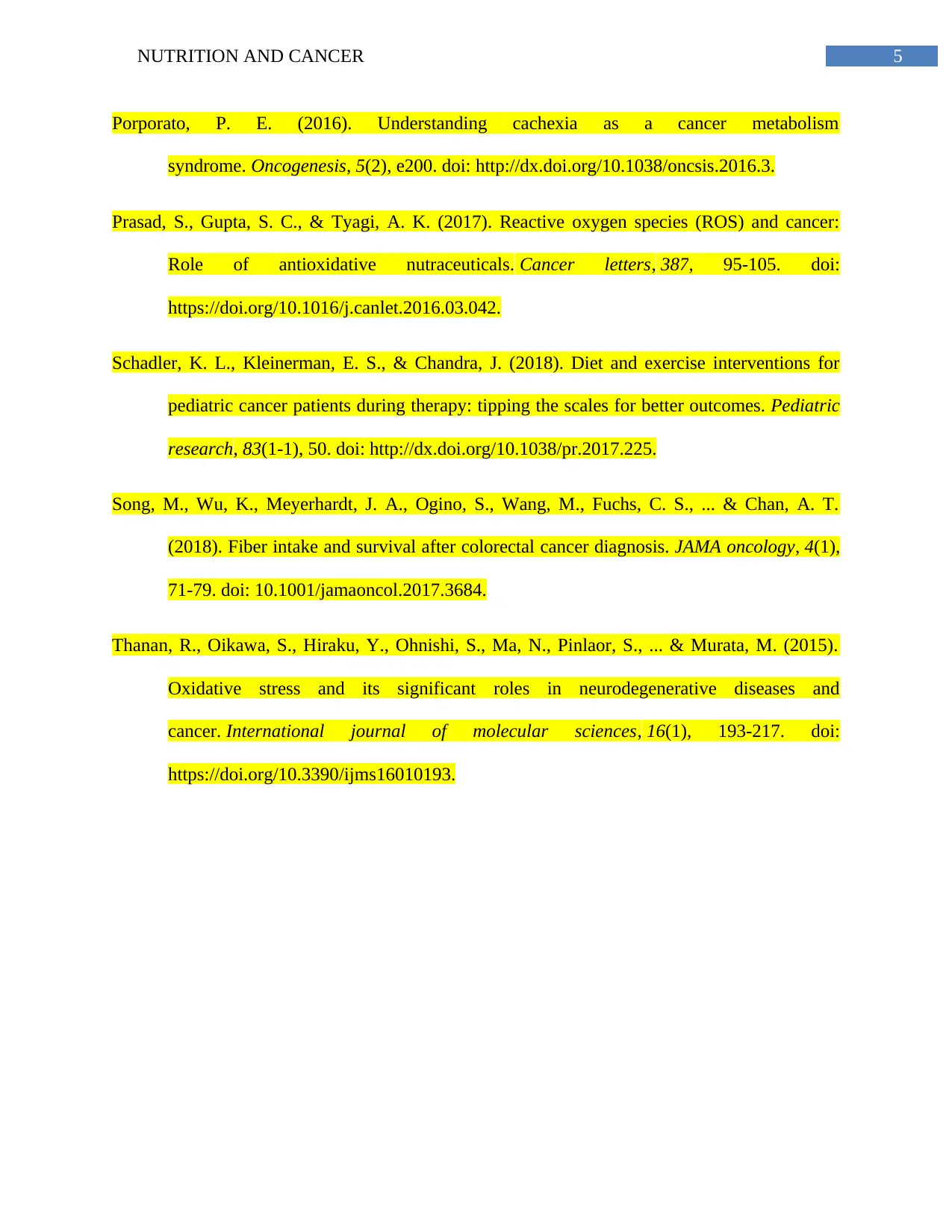
5NUTRITION AND CANCER
Porporato, P. E. (2016). Understanding cachexia as a cancer metabolism
syndrome. Oncogenesis, 5(2), e200. doi: http://dx.doi.org/10.1038/oncsis.2016.3.
Prasad, S., Gupta, S. C., & Tyagi, A. K. (2017). Reactive oxygen species (ROS) and cancer:
Role of antioxidative nutraceuticals. Cancer letters, 387, 95-105. doi:
https://doi.org/10.1016/j.canlet.2016.03.042.
Schadler, K. L., Kleinerman, E. S., & Chandra, J. (2018). Diet and exercise interventions for
pediatric cancer patients during therapy: tipping the scales for better outcomes. Pediatric
research, 83(1-1), 50. doi: http://dx.doi.org/10.1038/pr.2017.225.
Song, M., Wu, K., Meyerhardt, J. A., Ogino, S., Wang, M., Fuchs, C. S., ... & Chan, A. T.
(2018). Fiber intake and survival after colorectal cancer diagnosis. JAMA oncology, 4(1),
71-79. doi: 10.1001/jamaoncol.2017.3684.
Thanan, R., Oikawa, S., Hiraku, Y., Ohnishi, S., Ma, N., Pinlaor, S., ... & Murata, M. (2015).
Oxidative stress and its significant roles in neurodegenerative diseases and
cancer. International journal of molecular sciences, 16(1), 193-217. doi:
https://doi.org/10.3390/ijms16010193.
Porporato, P. E. (2016). Understanding cachexia as a cancer metabolism
syndrome. Oncogenesis, 5(2), e200. doi: http://dx.doi.org/10.1038/oncsis.2016.3.
Prasad, S., Gupta, S. C., & Tyagi, A. K. (2017). Reactive oxygen species (ROS) and cancer:
Role of antioxidative nutraceuticals. Cancer letters, 387, 95-105. doi:
https://doi.org/10.1016/j.canlet.2016.03.042.
Schadler, K. L., Kleinerman, E. S., & Chandra, J. (2018). Diet and exercise interventions for
pediatric cancer patients during therapy: tipping the scales for better outcomes. Pediatric
research, 83(1-1), 50. doi: http://dx.doi.org/10.1038/pr.2017.225.
Song, M., Wu, K., Meyerhardt, J. A., Ogino, S., Wang, M., Fuchs, C. S., ... & Chan, A. T.
(2018). Fiber intake and survival after colorectal cancer diagnosis. JAMA oncology, 4(1),
71-79. doi: 10.1001/jamaoncol.2017.3684.
Thanan, R., Oikawa, S., Hiraku, Y., Ohnishi, S., Ma, N., Pinlaor, S., ... & Murata, M. (2015).
Oxidative stress and its significant roles in neurodegenerative diseases and
cancer. International journal of molecular sciences, 16(1), 193-217. doi:
https://doi.org/10.3390/ijms16010193.
⊘ This is a preview!⊘
Do you want full access?
Subscribe today to unlock all pages.

Trusted by 1+ million students worldwide
1 out of 6
Related Documents
Your All-in-One AI-Powered Toolkit for Academic Success.
+13062052269
info@desklib.com
Available 24*7 on WhatsApp / Email
![[object Object]](/_next/static/media/star-bottom.7253800d.svg)
Unlock your academic potential
Copyright © 2020–2026 A2Z Services. All Rights Reserved. Developed and managed by ZUCOL.





